A Dream Concert by the God of the Jazz Bass
reported by Tamaeh Terai
![]()
A Dream Concert by the God of the Jazz Bass
reported by Tamaeh Terai
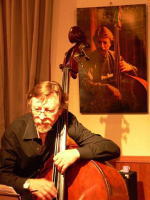 |
 George Mraz (bass) Ted Rosenthal (piano) Terry Clark (drums) |
| photo:Makoto Gotoh |
Who is George Mraz?
George Mraz is a living bass legend - he might even be called the god of the jazz bass - and to Japanese pianist Hisayuki Terai, a musical big brother whom he has adored for many years. George Mraz and Hisayuki Terai@ My husband, Hisayuki Terai, has been an ardent fan of Mraz since he
was a school kid in the '70s, when Mraz and Sir Roland Hanna made a lot
of recordings. Back in 1984, Hisayuki personally saw his idol Mraz when
he performed in a concert with the Tommy Flanagan trio for the first time
at Hisayuki's OverSeas club. At the time in Japan, big jazz musicians from
the US played nowhere but large concert halls or stadiums, so a Flanagan's
small club appearance was quite an event. With George Mraz on bass and
a great bebopper, Arthur Taylor, on drums, the performance included long
medleys of Ellington and Monk tunes that you probably never heard on recordings,
the concert was just amazing. I remember clearly Flanagan and Mraz played
while wearing our club T-shirts!
|
|||||
 |
Hisayuki(right)and Mraz on Mrach 2006 Mraz took a picture of himself and his portrait taken over twelve years ago with his own camera. |
@
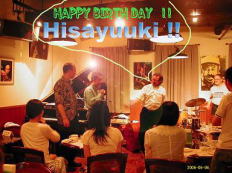
At Rehearsal |
||||
Makoto Gotoh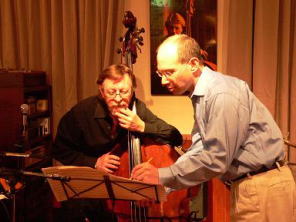 @@@@ @@@@ |
||||
| @ Today's program was specially made by Mraz himself just for the OverSeas
jazz club. The leader appointed a two-hour rehearsal, which is fairly long
for a master like Mraz - and for a bassist who has backache, I was afraid
that such a long rehearsal must be a torture. Nevertheless, Mraz was full
of life, carrying out the things he needed to do, with no need of the bass
stool. The trio completed a dozen of extremely demanding musical pieces
and before we knew it, they finished piece after piece with dispatch. Rosenthal
and Clarke followed their leader's navigation with a three-in-one spirit.
For the concert , Mraz brought a highly prestigious Czech contrabass for the first time here at our club. It has dark brown wood complexion that gives it an aura that reminds me of famed old Japanese swords. I note that Mraz he has another masterpiece that he found in Italy, made of nicely proportioned light brown wood with a flat back, which pianist Walter Norris once called a "canary", compared with which this Czech instrument, which is strongly mature in sound just like old vintage Bordeaux wine. For Mraz, artistically at his finest, I was confident that present Czech bass would fulfill the maestro's every demand. In addition, it was obvious to me that the young Rosenthal was fired up to play with Mraz in a trio setting, His fingers nimbly negotiating diabolically complex Mraz originals. He was satisfied with the work of piano technician Sadatsugu Kawabata, whose efforts are prized by great masters like Walter Norris and Monty Alexander. |
||||
| @ A drum master, Clarke brought seven(!) cymbals, from which he picked four, considering circumstances and conditions the way a great golfer in a big tournament would choose just the right clubs. Most of the cymbals were custom-made, some were distorted and some had cracks, where you can see the master's discriminating taste on the equipment, though he has never complained about the house drum set. A warm smile is always on his face, but he can never hide his keen intelligence or the dapper look that just a pair of Puma running shoes gives him. |
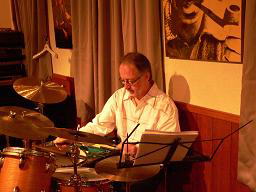 |
|||
| photo:Makoto Gotoh | ||||
| @Two solid hours of rehearsal went through like a few moment to us. Most
of the tunes were our particular favorites with new, special, memories
given to us by the trio. I gave deep bows of thanks and respects to the
beautiful musicianship of Mraz and his musicians. During a short break before the concert, having a soba noodle lunch, which is one of Mraz's favorite traditional Japanese snacks, the trio double-checked the program and greeted his familiar patrons coming in. |
||||
1st Show |
||||
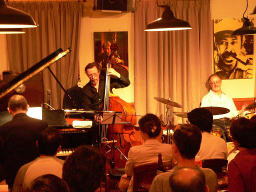 Makoto Gotoh |
||||
| Tense with expectancy for a musical marvel, the full house audience
was so quiet you could hear a pin drop. Mraz on stage wore a raven black shirt without a tie, under bluish gray jacket, contrasting with his usual stage appearance of dark suits and tie. A wide opened collar brings out his handsome features very well. At the piano, smiling Rosenthal in a blue blazer, blue shirt, and beige chino pants showed a midtown NY cheerful American look. Clarke, clean and neat in white shirt with light colored stripes sat up straight on the drum stool just like a martial artist who was fully aware of his body. The opening number, "Pepper", is one of the most Herculean bop tunes that Mraz ever wrote. It is one of the most exciting tunes to hear and among the most difficult to play. I was left breathless with Mraz's hard hitting punch for the audience ears at the very beginning of the show. "Pepper" refers to the late baritone saxophone master Pepper Adams, who was a very good friend of Mraz since their time together with the Jones-Lewis Orchestra, and who grew up with Tommy Flanagan and Sir Roland Hanna in Detroit. Pepper, a small guy with a big straight-as-an-arrow spirit and a real bebopper to the core, was liked by many musicians with his slashing playing and wit. Mraz distilled Pepper's musical quintessence under the structure of "Stella by Starlight" into the piece. The complex bebop melody played in unison followed by solos was just breathtaking. During the drum solo, Mraz took off his jacket, with his rosy skin visible under the black shirt emitting a masculine allure. "Wisteria" is another original that Mraz often recorded in various settings, having a mysterious beauty that you can never forget. Its musical score decorates a wall at OverSeas and was personally given to Hisayuki by Mraz when he visited Japan on a Philip Morris Superband World tour many years ago. Hisayuki and bassist Kazuhiro Sumi duo played the tune for the composer last March. Mraz announced the tune, saying that it would be played "with different arrangement, tonight". A long rubato by Rosenthal and the melody played in samba-style by Mraz contrasted vividly, with Clarke, running along with Mraz to a T with perfect dynamics. In short, their work as a team showed a complete understanding of the music. As old Japanese proverb says, "The shrewder hawk keeps its talons hidden". Clarke is the sharpest drummer who never shows off. Our house drummers, Tatsuto Kawahara, Ippei Suga with mixed look of happiness and strain, carefully watched how the master shaded the music. "A Sleepin' Bee", Mraz announced, was "often performed with Flanagan, but today we are going to play with Ted's arrangement." It's a familiar piece that Hisayuki likes to play in the summer. It's a Harold Arlen song from the Broadway show "A House of Flowers", and is about an old Caribbean fable about love that "If a bee sleeps in your palm, you will win your love." Some in the audience must be reminded that Flanagan played a Basie-like interlude back in 1996 at OverSeas. Tonight, Ted's arrangement as in his CD, <Threeplay>, swung so vividly that it might wake up the bee. |
||||
| @ Mraz brought one of the high points when brought his God-like bowing into the heart-melting medley "Haunted Heart - My Foolish Heart", tunes made famous with Bill Evans recordings, but with Mraz's interpretation being far more mature and more fragrant. His tone, soft as velvet, flowed from his ultimately smooth bow movement was literally a haunting beauty that embraces the soul. As he created breathtaking sound ripples, he looked as if approach seemed effortless, and as if the jewel-like contrabass could stand up by itself. No gimmick, no pretense, the genius just facing up to the music to make enchanting moments. Acoustic bass sound vibrations you through the floor and from the walls has brought you to nirvana... At his finish, long sighs of ecstasy came from the audience. |
||||
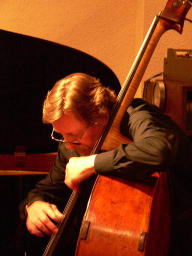 Makoto Gotoh Makoto Gotoh |
||||
| When Mraz said "We are going to play one of Ted's originals",
the pianist grinned as if he were a school kid given compliment by the
teacher. The tune, "A New Theme" was also recorded in the CD
<Threeplay>, and was originally composed for piano and orchestra, Hearing his energetic and sensitive performance live, you can see how Rosenthal stands out in the New York jazz scene. |
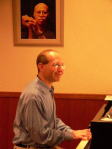 Makoto Gotoh Makoto Gotoh |
|||
| @ If you went to a Jazz Elite 2006 concert you would surely have had a chance to hear the standard , "I Should Care" by the Mraz Super Quartet. Tonight, you could have enjoyed thrilling bar-trades among the trio, where a gutsy Rosenthal quotes Bud Powell's "Wail", filling his bars full of bravura, and against whom Mraz stood like a rock answering back to him with dignity, while Clark considered balance as his first priority, showing his maturity. The piece to close the first show was the ultimate Parker blues, "Au Privave", a sizzling showcase for the consummate bebop artistry of Mraz's overtones and top-flight skills throughout all imaginative passages. During the short intermission, Mraz was surrounded by enthusiastic fans and seemed to have no time to relax, with Rosenthal busy selling his CDs that he brought. The room became jam-packed with even more people, so the waiters had to work hard not to bump into our patrons. @ |
||||
2nd Show |
||||
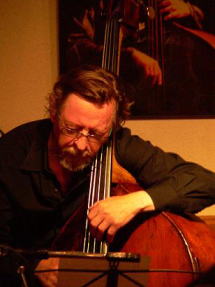 George Mraz |
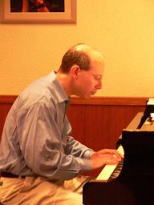 Ted Rosenthal |
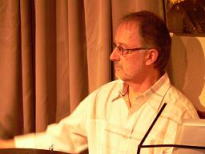 Terry Clark photo:Makoto Gotoh |
||
| @ The second show came at last. As soon as they got ready, Hisayuki yelled
"Hey, Tamaeh! Mr. Mraz has spilled some water!" Mraz had knocked
over the bottle of water I had given him, because I had placed in a bad
spot. I worried what might have happened if his invaluable bass had gotten
wet.... I deeply apologized, but the ever-gracious Mraz simply responded
"No, it was my fault". I made the deepest bow with thanks again
in heart. I then heard him whisper to the musicians "God Bless Us",
they got back "Yeh!", and the show then started... " Now, we are going to start not to be electrocuted ..." Mraz joked and called out the audience's most favorite Mraz original, "Picturesque", which is performed every Wednesday at our club by the Hisayuki-Sumi duo team called "Echoes". "Picturesque" is based on the musical frame of "No Greater Love" and the title is a play on words with "Humoresque" composed by fellow Czech Dovorzak, whose genius bloomed in the US, just like Mraz's. Bassist Kazuhiro Sumi was all eyes and ears bent down just to absorb everything from the god. Mraz exhibited perfect pizzicatos which developed into brisk legato walking. His phenomenal work seemed to send sparks flying between the trio and the audience. This was followed by a Chopin Nocturne which showcased Rosenthal's excellent classical skills and was great material for hearing an exquisite bass obbligato that integrated classical aesthetics and swung into something modern. It was a nice selection to simmer down the excitement. After Chopin, there come a time for Thad Jones, whom Tommy Flanagan once mentioned as being much bigger than Mozart, again our favorite piece called "Three and One", which also Mraz played with Hisayuki during his visit last March. "I often played it with Jones - Lewis Orchestra," related Mraz. When I was a high school kid in the '70s, the orchestra came to Japan and was a dream team of jazz legends such as, Mraz, Sir Roland Hanna, and Pepper Adams.....I still remember clearly enjoying an hour-long special TV program called the "Thad-Mel show", at the time I didn't even imagine that I would one day be able to call the bassist my virtual brother-in-law. The pretty and elegant melody, characteristic of Detroit bop, was played in unison, but was a bit different from how Flanagan used to play it, perhaps this is the original Jones melody. Even at the back of the room, the sound was crystal clear, with the trio in perfect balance. |
||||
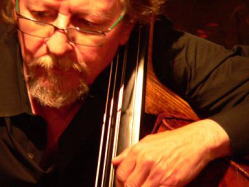 Makoto Gotoh |
Mraz next called another one of his specialties, the most awaited "Passion Flower", which all bassists who perform here at OverSeas club try to play. Whenever you hear his performance on this sensuous Billy Strayhorn masterpiece, you will surrender yourself to its awesome beauty. |
|||
|---|---|---|---|---|
| @Perfectly controlled from the lowest through the highest, mellifluous
tone, vivid passages, overtones one after another, everything characteristic
of Mraz, along with bowing vibrations, he glows and shiny hair waves. In
front of the consummate performance the audience has came under his spell. The moment Mraz finished his cadenza with unbelievable high notes was a magical moment with no other sound, which gives you some inspiration. I have heard that French people call such a moment a "coup de foudre", under which spell you whole life might change. The crowd who was just striken by a "coup de foudre" from the bandstand, and responded with the longest applause of the night. Then the trio next played the standard "Emily", as if to sooth the heat with a waltz, where you could enjoy tasteful bass line with Rosenthal. The best thing was yet to come, as Mraz announced, "I played Denzil's Best often with Tommy Flanagan...", I saw an illusion of Flanagan in his in "Eclypso" photo on the wall beside rolling his eyes. When the album <Eclypso> came out from Enja records, most jazz bassist in Japan must have tried to play "Denzil's Best". Mraz knows that this is showcase for a bass skills, and is a closing tune of the Hisayuki and Kazuhiro duo. Tonight, they swung hard in a little faster tempo. Rosenthal quoted " Lullaby of Birdland " several times during the tune, which is based on "Lullaby of the Leaves". The simple approach made Mraz's virtuosity come through even more clearly. The last piece of the dream concert was "Cup Bearers" written by Tommy Flanagan's favorite composer Tom McIntosh. Its irregular structure, with twists and turns, helps make the piece a quite favorite among our patrons, although it's not necessarily a famous standard. Mraz recorded this tune with Flanagan in two albums: <Eclypso> and <Confirmation>. This is a memorable piece. When Mraz played a concert with pianist Syrus Chestnut and drummer Lewis Nash, called "Manhattan Trinity" not long after Flanagan died, he played it as an encore for us in memory of Tommy. Tonight, his bass solo was just overwhelming, leaning on the bass that seemed to be rooted to the floor. Mraz plays with the dignified aura and allure of a virtuoso, he is surely the god of the jazz bass! In response to an ardent standing ovation, they played the encore, "In A Sentimental Mood", which Mraz recorded duo with Sir Roland Hanna in the album <1 ~ 1 >, his bowing artistry took us into a trance again and the dream concert was over. |
||||
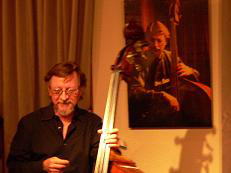 photo:Makoto Gotoh |
||||
| Tonight, was all saw and heard the true god of bass of the present,
and his portrait of almost a quarter century ago hanging beside the trio.
The "Dream Concert" tonight might be a fruit of time and tide
between two Mraz portraits, and the memory will linger in our hearts. The god of bass, George Mraz is our eternal big brother! |
||||
| George, A-RI-GA-TO!, we love you!! And, A-Ri-Ga-To, the audience! |
||||
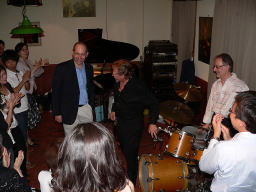 Makoto Gotoh |
||||